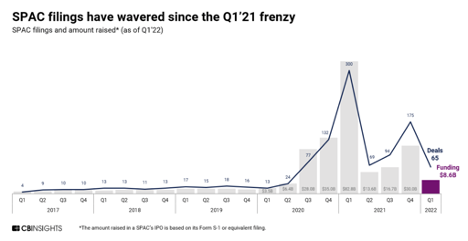A SPAC doesn't have to be an accounting backtrack for your biotech
by Auxilius on Jan 12, 2023 6:00:00 AM
While rumors of the SPAC’s demise may have been greatly exaggerated, the “blank check” route into the public markets may have lost its luster since its boom in 2020-21.
“SPACs represented nearly 20% of the total IPO market in 2021,” according to PharmaLetter and CB Insights, a marked increase over the years prior to 2020. However, this blip may have been an anomaly, as the first quarter of 2022 came and went without a single biotech SPAC and the quarters since have seen only minimal SPAC activity (following a broader trend of tepid IPO momentum).

Source: CB Insights, April 2022
As noted by Reuters, “in a typical SPAC structure, a SPAC goes public through the traditional IPO process, raising significant capital, and then has a limited amount of time to find a private company candidate to merge into it through a reverse merger. For the private company, SPAC mergers [“de-SPACs”] carry many of the same advantages and disadvantages as reverse mergers. They can be completed faster than a traditional IPO, but require a vote of the SPAC shareholders, and carry the same lack-of-stabilization risks post-merger.”
For the hundreds of “de-SPACs,” the instant metamorphosis into public-facing maturity may have come at a cost. In a recent article, the Financial Times highlights “research by [the investment research company] Bedrock AI in September [2022, which] found 49 per cent of the quarterly financial filings by de-SPACs since 2020 contained an admission of ineffective internal controls… [and] a review of more recent filings, covering the third quarter, shows only a small number of the companies with problems had been able to rectify them.”
While Reuters finds that the SEC increased rulemaking around enhancing accounting and business disclosures throughout 2021 and 2022, this Financial Times report hints at underlying issues in SPACs, whether caused by selection bias (were those companies choosing to go public via SPAC more at risk for ineffective controls?) or more fundamental issues in SPAC governance (i.e. underwriter accountability during a traditional IPO).
If your biotech went public via SPAC, get your clinical R&D house in order
Financial management matters. For investors, regulators, employees, and others, a clean bill of financial health starts with the basics: strong internal controls, processes, and reporting across the organization. For biotechs, these basics are uniquely challenging given the outsourced and opaque nature of clinical R&D (typically a lion’s share of a biotech’s expenditures).
A convoluted web of sites, investigators, contracts, vendors, and third parties often leave biotech finance and accounting leaders in the dark across clinical trials forecasting and accruals. This information is crucial to financial disclosures and material strength in reporting, yet key information is often missing or lagging when siphoned through the CRO-sponsor communication channels. Leaders may face a wait of weeks or months for data on work performed and face a days-long close process each period as they wrap up the books.
Additionally, biotechs require a strong compliance posture across their internal controls and process, which is often hard to maintain when work is completed in spreadsheets or industry-agnostic tools. Changes are not logged, users are not permissioned, a clear audit trail becomes near impossible. Your Excel model is only as strong as your user and the loss of one team member may capsize months of work.
Auxilius fills this void by providing your biotech with the financial intel it needs as well as the compliance-centered process it requires. Uniquely designed for the complexity of clinical trials, Auxilius gathers and aggregates disparate data from your clinical and financial tech stack (ERP, EDC and more) to guide key workflows across forecasting, accruals, and reporting – all in a user-specific, SaaS technology platform that is aimed at auditability and scale. Our biotech customers often uncover notable and unanticipated discrepancies in their spend, allowing them to better plan and perform.
Whether the SPAC roars back is unclear in the year ahead. However, audit-ready process and controls are within reach for any clinical stage biotech, SPAC or no SPAC.
Get in touch with our team to learn more.
Share this
- November 2024 (1)
- October 2024 (2)
- September 2024 (1)
- August 2024 (6)
- June 2024 (2)
- December 2023 (1)
- October 2023 (1)
- September 2023 (4)
- April 2023 (1)
- February 2023 (2)
- January 2023 (2)
- December 2022 (1)
- November 2022 (2)
- October 2022 (3)
- September 2022 (4)
- August 2022 (2)
- July 2022 (2)
- June 2022 (2)
- May 2022 (3)
- April 2022 (3)
- March 2022 (1)
- August 2021 (1)
